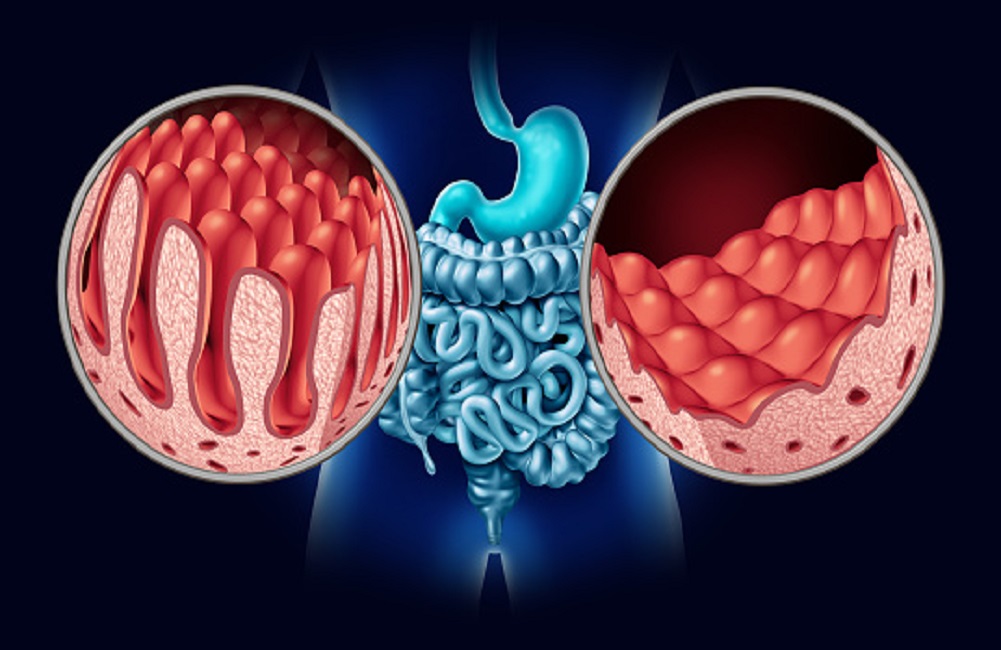-
Definition: It is an autoimmune disorder that is triggered by eating Gluten(a protein found in wheat ,barley and rye).
-
It is also called Celiac Sprue/Gluten- sensitive enteropathy.
-
Therefore ,consumption of gluten creates inflammation that damages the small intestine’s lining, preventing absorption of some nutrients.
-
Age group affected: Any age group (from infant to adulthood).
RISK FACTORS
Coeliac disease tends to be more common in people who have:
-
Family history of coeliac disease or Dermatitis Herpetiformis.
-
Type 1 Diabetes Mellitus.
-
Down syndrome or Turner syndrome.
-
Autoimmune thyroid disease.
-
Microscopic colitis.
-
Addison’s disease
-
Gastro-intestinal infections.
-
Emotional stress.
-
Rheumatoid arthritis
-
Irritable Bowel Syndrome
-
Genes: HLA-DQ2,HLA-DQ8
COMMON SYMPTOMS OF COELIAC DISEASE
-
Abdominal pain.
-
Anemia
-
Bloating
-
Joint pain
-
Constipation
-
Diarrhea
-
Flatulence
-
Heartburn
-
Dermatitis Herpetiformis (Itchy blistery rashes)
-
Mouth Ulcers
-
Nausea
-
Weight loss
-
Steatorrhea (foul-smelling stool).
-
Nervous system injury leading to numbness or tingling of hands or feet.
COMPLICATIONS
-
Severe anemia
-
Damaged tooth enamel
-
Lactose intolerance
-
Malnutrition
-
Pancreatic disease
-
Peripheral neuropathy
-
Brittle bones: Osteopenia,osteoporosis
-
Lymphoma
-
Intussusception
-
Infertility or miscarriage
DIAGNOSIS
-
Tissue Transglutaminase IgA test (tTG- IgA): A test that helps to detect coeliac disease. In coeliac disease the immune system mistakenly thinks that Gluten is a foreign body. It makes antibodies that attack an enzyme in the intestines called tTG.
-
Optimal Range: 0-3U/ml or 0.00-100.00 ug/g.
-
OTHER TESTS:
-
Total Serum IgA
-
DGP IgA and IgG
-
Endoscopy
-
Radiology
SCOPE OF HOMEOPATHY IN TREATING COELIAC DISEASE
Homeopathy has a huge scope in the treatment of coeliac disease as it helps in correcting the root cause of the disease. This is possible due to a natural and safe approach in homeopathy. Thus helps in reducing the intensity of symptoms by working upon the individualistic, holistic and dynamic spheres of the patient. Homeopathy treats the patient as a whole, strengthens the immune system and brings the tTG enzyme range back to normal over a period of time.
Top 5 Homeopathic medicines in Coeliac Disease:
1. CINCHONA OFFICINALIS:
-
It is indicated after loss of vital fluids from the body, leading to marked weakness and prostration.
-
Symptoms include: Diarrhea with fatigue. There is excessive flatulence while passing stool. Stool is yellow in color with undigested food.
-
There’s great belching with bitter taste.
-
Bending double gives relief in abdominal pain.
2. ARSENICUM ALBUM:
-
Indicated when there is extreme weight loss along with mental and physical restlessness.
-
Diarrhea with foul- smelling stool and flatulence.
-
Severe prostration and anxiety about disease.
-
Stool smells of rotten eggs.
-
Cramping in the intestines arises along with stool.
-
Heartburn, nausea and vomiting may also occur.
3. CARBO VEG:
-
Indicated when stool is frequent and offensive. The stool may be accompanied with great flatulence in the upper abdomen.
-
There is constant belching and the patient affords great relief from constant eructations.
-
Distension of abdomen, making it difficult to wear any tight clothing around the waist.
4. LYCOPODIUM:
-
Suited when there’s excessive flatulence especially marked in the lower abdomen.
-
The stomach easily becomes bloated with sharp pain.
-
Even a mouthful of food fills up to the stomach.
-
Sometimes, there can be extreme constipation in patients who have a semi dropsical physical appearance especially from the lower side of the body .
5. KALI CARBONICUM :
-
Key indications are weakness, chilliness and backache.
-
There may be unreleased flatus with hard distension of the abdomen.
-
Stomach feels as if it will burst.
-
Sour belching may be present.
-
Painless diarrhea can be a symptom.
-
The patient is routine, duty bound. rigid and highly sensitive to touch.
-
Also there may be anxiety at the solar plexus region.

